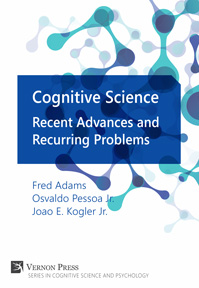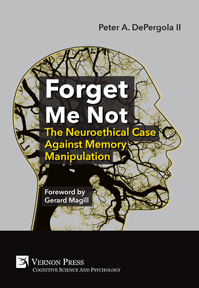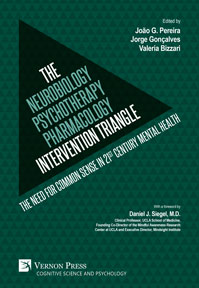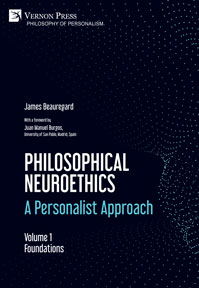Automata’s Inner Movie: Science and Philosophy of Mind
Manuel Curado, Steven S. Gouveia (Eds.)
by Sami Nenno , Steven S. Gouveia (University of Porto, Portugal), Manuel Curado (University of Minho, Portugal), Ivan V. Ivanov , Zong Ning , Federico Zilio (University of Padova, Italy), Nathália Pantaleão , Nicolás F. Lori (Universidade do Minho, Portugal), Emilia Samit , German Picciochi , Paulo Jesus , Eros Moreira de Carvalho (Universidade Federal do Rio Grande do Sul, Brazil), Igor F. Mikhailov , Maiya Jordan (McGill University, Canada), Veridiana D. Cordeiro , Hugo Neri , Judite Zamith-Cruz (Universidade do Minho, Portugal), Paulo Vieira , Alexander Lazarov (Sofia University, Bulgaria), Andrea Roselli , Liat Lavi , Manuel Cebral , Hortense de Villaine
Purchase this book
(click here to change currency)
The branch of philosophy called “philosophy of mind” has been center stage in the discipline for over a half-century. Involving issues such as consciousness, perception, and intentionality, the sub-discipline has often intersected with the sciences, particularly those of biology and neuroscience. This timely book draws together thinkers trained in the logical and concept-driven methodologies of philosophy with those trained in the empirical sciences. Importantly, it affords the reader a multidisciplinary book that guides them in the general approaches to the problems, theories, and areas that are involved.
It begins with a section devoted to a historical overview of the general problems in the Philosophy of Mind. The next section begins the “transdisciplinary” dovetailing of philosophy with science, with chapters examining predictive processing, semantics, and issues free-will in mental health. Section III continues the philosophical examination of traditional concerns such as self-awareness and identity formation, with the final two sections facing such pressing issues as human versus artificial intelligence, and the ethical issues surrounding big data.
The volume allows readers to understand the general field of Theoretical Neurophilosophy, which brings together both the fact-based practices in the science with the concept-based tradition in philosophy; a linkage the editors refer to as the “concept-fact linkage.” Science’s dependence on theoretical frameworks mirrors philosophy’s dependence on empirical data; this volume unites the two missions.
Prof. Dr. Dena Shottenkirk
Brooklyn College, The City University of New York
This book brings together researchers from a variety of fields to jointly present and discuss some of the most relevant problems around the conscious mind. This academic plurality perfectly characterizes the complexity with which a current researcher is confronted to discuss and work on this topic.
The volume is organized as follows: Part I introduces the general problems of Philosophy of Mind and some historical perspectives. Part II focuses on understanding the input that the empirical sciences can offer to the theoretical problems. Part III discusses some of the core concepts of the field, namely, perception, memory and experience. Part IV debates human and artificial intelligence and, finally, Part V deliberates about the computation and the ethics of big data and artificial intelligence.
The book contains valuable material for researchers in several fields such as Cognitive Science and Neuroscience, Psychology and Artificial Intelligence, and Philosophy. It can also be used as a guide to some courses at various levels, from BAs to MAs and PhD courses of several fields. It is our belief, as it is claimed in the preface by Georg Northoff, that there is an urgent need for a truly transdisciplinary exchange between philosophy and the sciences in order to stimulate some real progress. We hope that this book will become a sound step for such an interdisciplinary enterprise.
LIST OF ACRONYMS
LIST OF ILLUSTRATIONS
PREFACE
Georg Northoff
University of Ottawa
INTRODUCTION
Manuel Curado
University of Minho
Steven S. Gouveia
University of Minho
PART I INTRODUCTION AND HISTORICAL PERSPECTIVES
CHAPTER ONE
PHILOSOPHY OF MIND AND REDUCTIONISM
Steven S. Gouveia
University of Minho
CHAPTER TWO
THOMAS HENRY HUXLEY AND THE MIND-BODY PROBLEM
Hortense de Villaine
Université Paris Nanterre
CHAPTER THREE
AN ESSAY AGAINST PHILOSOPHY OF MIND: READING UNLOVED THEORIES
Manuel Curado
University of Minho
CHAPTER FOUR
NAVIGATING BERKELEY’S PUZZLE: OBJECTIVITY, EXPERIENCE, AND THEIR RELATIONS
Ivan V. Ivanov
Shandong University
PART II PHILOSOPHY OF MIND: DIALOGUING WITH SCIENCES
CHAPTER FIVE
REPRESENTING THE WORLD WITH OCCAM’S RAZOR: AN INFORMATIONAL TELEOSEMANTICS ON THE BASIS PREDICTIVE PROCESSING PARADIGM
Zong Ning
The University of Tokyo
CHAPTER SIX
(NEVER)MINDING THE GAP? INTEGRATED INFORMATION THEORY AND PHILOSOPHY OF CONSCIOUSNESS
Federico Zilio
University of Padua
CHAPTER SEVEN
BRAINS AND LANGUAGE: THE COGNITIVE ASPECT OF SEMANTICS
Nathália Pantaleão
University of Campinas
CHAPTER EIGHT
FREE-WILL PERCEPTION IN HUMAN MENTAL HEALTH: AN AXIOMATIC FORMALIZATION
Nicolás F. Lori
University of Minho
Emilia Samit
INECO Neurociencias Oroño, Grupo Oroño
German Picciochi
Universidad Nacional de Buenos Aires
Paulo Jesus
University of Lisbon
PART III PERCEPTION, MEMORY, AND EXPERIENCE
CHAPTER NINE
A PROCESS-BASED APPROACH TO VISUAL MOTION
Sami Nenno
University of Vienna
CHAPTER TEN
SOCIALLY EXTENDING THE MIND THROUGH SOCIAL AFFORDANCES
Eros Moreira de Carvalho
University of Rio Grande do Sul
CHAPTER ELEVEN
NECESSARY SELF-AWARENESS
Maiya Jordan
McGill University
CHAPTER TWELVE
PLACING THE SUBJECTIVE LOCUS IN THE ENVIRONMENT: HOW SOCIAL MEDIA IS ENHANCING THE AUTOBIOGRAPHICAL REMEMBERING AND IDENTIFY FORMATION PROCESSES
Veridiana D. Cordeiro
University of São Paulo
Hugo Neri
University of São Paulo
PART IV ARTIFICIAL AND HUMAN INTELLIGENCE
CHAPTER THIRTEEN
CAN MACHINE INTELLIGENCE OVERCOME THE HUMAN ONE?
Judite Zamith-Cruz
University of Minho
Paulo Vieira
University of Porto
CHAPTER FOURTEEN
DO WE DESIGN ARTIFICIAL INTELLIGENCE IN HUMAN-LIKE DISCOURSE?
Alexander Lazarov
Sofia University “Kliment Ohridski”
CHAPTER FIFTEEN
A TEMPORAL PERSPECTIVE ON ARTIFICIAL INTELLIGENCE: TIME IN BRAINS AND MACHINES
Andrea Roselli
University of Roma Tre
PART V COMPUTATION AND THE ETHICS OF BIG DATA AND ARTIFICIAL INTELLIGENCE
CHAPTER SIXTEEN
STRETCHING PERSONHOOD BEYOND HUMANS: WHAT RECENT DISCUSSIONS ON ANIMAL RIGHTS CAN TEACH US ON THE ETHICAL AND POLITICAL TREATMENT OF ROBOTS
Liat Lavi
Bezalel Academy of Arts and Design
CHAPTER SEVENTEEN
IS BIG DATA THE NEW CAPTURE MACHINE? CORRELATIONS BETWEEN DATA MINING AND GILLES DELEUZE PHILOSOPHY
Manuel Cebral
Santiago de Compostela University
CHAPTER EIGHTEEN
THE PROPER PLACE OF COMPUTATIONS AND REPRESENTATIONS IN COGNITIVE SCIENCE
Igor F. Mikhailov
Institute of Philosophy, RAS
LIST OF CONTRIBUTORS
INDEX
Steven S. Gouveia studies Philosophy of Mind at the University of Minho under the supervision of Professor Manuel Curado and Professor Georg Northoff. He is a researcher at the Mind, Language and Action Group of the Institute of Philosophy of the University of Porto and at the Lisbon Mind & Reasoning Group, IFILNOVA - Nova University of Lisbon. He is a visiting researcher at the Minds, Brain Imaging and Neuroethics at the Royal Institute of Mental Health. He is also the Editor-in-Chief of “Apeiron: Student Journal of Philosophy”. He has published various articles and book chapters on several topics, including Neurophilosophy, Philosophy of Neuroscience, Democracy and Philosophy of Arts. More information can be found at: stevensgouveia.weebly.com.
Manuel Curado is Professor of Philosophy at the University of Minhoand holds several degrees, namely National Defense Auditor (Ministry of Defense, Lisbon) and Senior Management in Public Administration (University of Minho). He is doctor cum laude from the University of Salamanca and previously obtained his master's degree from the New University of Lisbon. He delivered many conferences worldwide, from Moscow, Russia (MGLU and MGIMO), to Brasilia, Brazil (UnB), and was Erasmus Professor in Padova, Italy. He is the author of several books, including the first critical edition of an eighteenth-century manuscript (now at the Thomas Fisher Library of the University of Toronto) written by a fellow of the Royal Society of London, Dr. Isaac S. Samuda, MD.
Brain, Mind, Neuroscience, Artificial Intelligence, Consciousness, Experience, Descartes
See also
Bibliographic Information
Book Title
Automata’s Inner Movie: Science and Philosophy of Mind
ISBN
978-1-62273-631-7
Edition
1st
Number of pages
387
Physical size
236mm x 160mm

![Automata’s Inner Movie: Science and Philosophy of Mind [Hardback]](/file/8418/269c45baa2826a593e37a0d8faf3afd5/1553857802.jpg)






